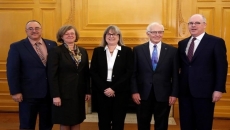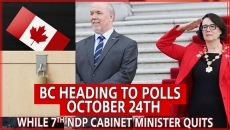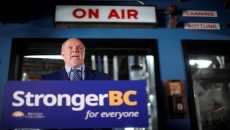The federal government has reluctantly given green lights to both Ontario and New Brunswick to use their own carbon-pricing systems for big industrial emitters, rather than have a federal program imposed on them.
The decisions come on the eve of a Supreme Court of Canada hearing that will decide if Ottawa has the jurisdiction to set a national standard for carbon pricing and impose federal programs on any provinces that don't comply.
Environment Minister Jonathan Wilkinson wrote to his counterparts in both New Brunswick and Ontario Sunday to acknowledge their proposals to tax greenhouse gas emissions from heavy industry meet the federal rules in theory but will not have the same impact on climate change.
"The system that you have designed is significantly weaker than the federal backstop, and it will result in fewer emissions reductions," Wilkinson wrote to Ontario Environment Minister Jeff Yurek.
A similar letter was sent to New Brunswick Environment Minister Jeff Carr.
Wilkinson's department has not yet provided the analyses showing the differences between the federal and provincial programs. The federal government requires any industrial facility that produces more than 50,000 tonnes of greenhouse-gas emissions a year to be part of the big industrial emitters system, and pay the carbon tax on a portion of its emissions.
That price is currently $30 a tonne and goes up $10 in each of the next two years until it hits $50 in 2022. Ottawa intends to review the program after 2022 and is indicating that it will be tightening the rules for big emitters at that point because provinces have found loopholes that allow them to meet the federal benchmarks without cutting the same amount of emissions.
Ontario's system, for example, phases in the strictness for emissions and is using a credit system the federal government says weakens the overall result because some companies won't have to do much to curb their emissions for quite some time.
Wilkinson asks Yurek and Carr to work with Ottawa to beef up their programs, saying while COVID-19 is the main priority for all governments, climate change is a crisis that will not be going away.
Yurek said in a written statement that the province is phasing in the limits but that nobody will get a free pass.
"It is a more tailored program for Ontario’s environment and economy because it helps us achieve emission reductions from big polluters and achieve our share of Canada’s 2030 emissions reduction target without driving away business and job creators," he said.
Ottawa has a separate carbon tax that is paid by individuals and businesses with less than 50,000 tonnes of emissions a year. The price is the same, but is charged on purchases of fuel, such as gasoline or natural gas, based on the emissions produced when that fuel is burned for energy.
At the current $30 a tonne, the carbon tax adds a little more than six cents to the cost of a litre of gasoline, and almost six cents per cubic metre of natural gas.
The fuel tax is currently applied in Alberta, Saskatchewan, Manitoba and Ontario, and the big industrial system after today will apply fully only in Manitoba and Prince Edward Island. In Saskatchewan, the federal system applies only to natural-gas pipelines and electricity generators, which are not subject to that province's carbon price for industry but are supposed to be under the federal rules.
The Supreme Court begins two days of hearings Tuesday to decide whether Ottawa had the jurisdiction under the Constitution, to impose a national carbon price the way it did.






